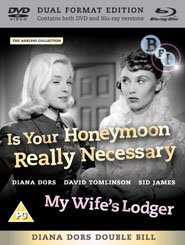Britain’s best known blonde bombshell takes centre stage in a new double bill release from the BFI’s Adelphi Collection, two films which feature the talents of Diana Dors in her prime.
 In 1953’s Is Your Honeymoon Really Necessary, Dors plays Candy, the ex-wife of US airman Laurie Vining (Bonar Colleano), whose plans for a little R & R with his new bride are put in jeopardy by Candy when she claims the pair are still husband and wife.
In 1953’s Is Your Honeymoon Really Necessary, Dors plays Candy, the ex-wife of US airman Laurie Vining (Bonar Colleano), whose plans for a little R & R with his new bride are put in jeopardy by Candy when she claims the pair are still husband and wife.
My Wife’s Lodger, from 1952, sees Dors star as Eunice, daughter of soldier Willie Higginbotham who has returned from six years away to find a new man, Roger the Lodger (Leslie Dwyer), with his feet under the table and his family barely aware he’s back.
With Carry On star Sid James on hand (complete with suspect American accent) in Honeymoon, and a plot which seems to be trying to emulate screwball US comedies from the 1940s, this is the better film of the pair. Dors is on form as the sexy Candy, a sparkle in her eye that’s a far cry from the look viewers would come to expect in later years. While My Wife’s Lodger has a constant barrage of one-liners, Dors getting her fair share which she handles with aplomb, they do get wearing after a while.
Coming in a package which combines a DVD and Blu-ray copy of each film, both looking better than ever before, this is top notch treatment for two 1950s comedies which might not be well remembered but which offer fans of Dors and lesser remembered British movies of the period.
Also out now from the BFI is the first ever DVD release of Ken Loach’s director’s cut of his 1979 children’s film, Black Jack.
 Filmed in his trademark naturalistic style and set in the 18th century, the film features a young boy, Tolly (Stephen Hirst), who becomes embroiled in the machinations of Black Jack (French actor Jean Franvel), a criminal who is almost hanged but who survives to go on the run with his new friend.
Filmed in his trademark naturalistic style and set in the 18th century, the film features a young boy, Tolly (Stephen Hirst), who becomes embroiled in the machinations of Black Jack (French actor Jean Franvel), a criminal who is almost hanged but who survives to go on the run with his new friend.
Encountering an upper-class party travelling through the woods, the pair are hired to find an escaped lunatic girl, a search which will see the pair coming to the girls aide while getting mixed up in various schemes as part of a travelling fair.
Deserving of being dubbed a “romp”, Black Jack is both great fun and a beautiful film to look at: Loach has an eye for interesting angles and allows his actors to breathe, the style similar to his 1969 classic Kes, but this time with in period garb and guns.
A commentary from Loach describes the process which went into making the film and he’s not afraid to be critical of his own talents while reminding us that it was made in a hurry and on a tight budget.


